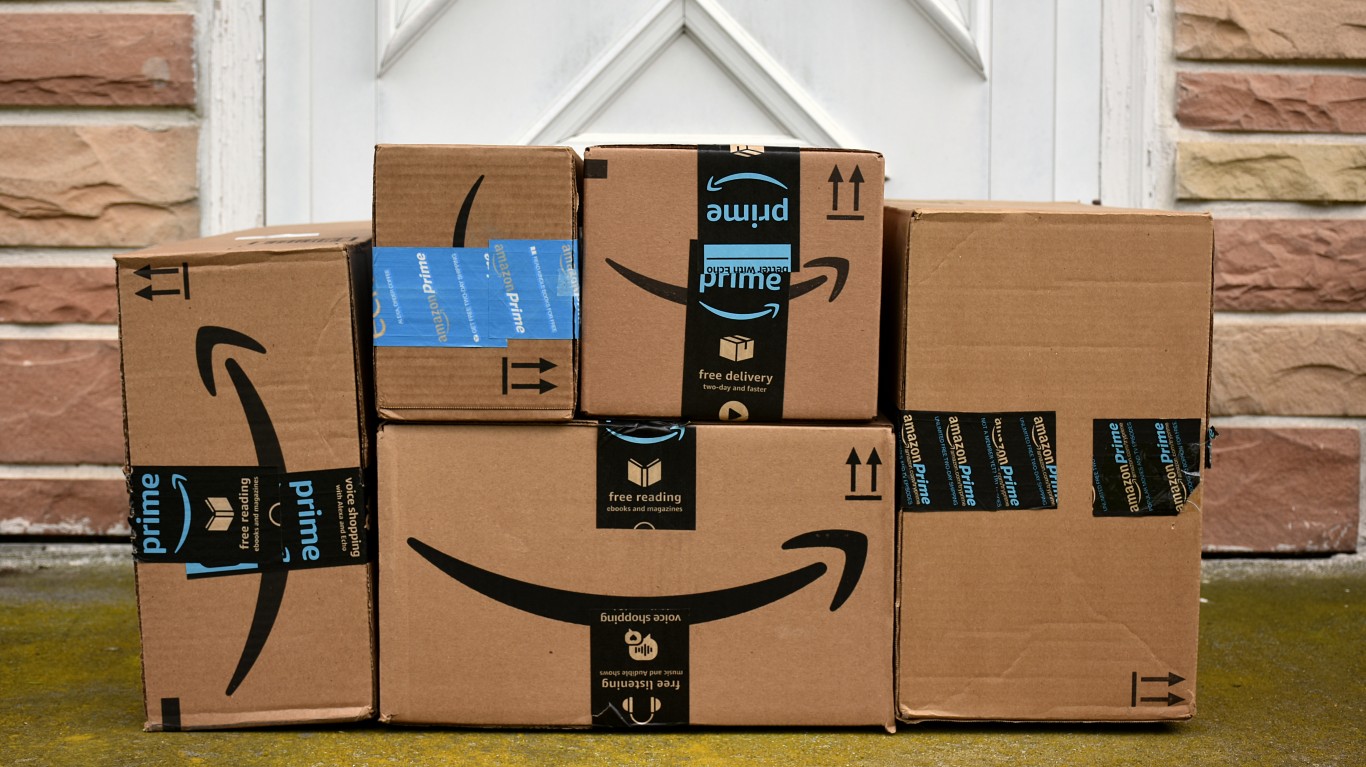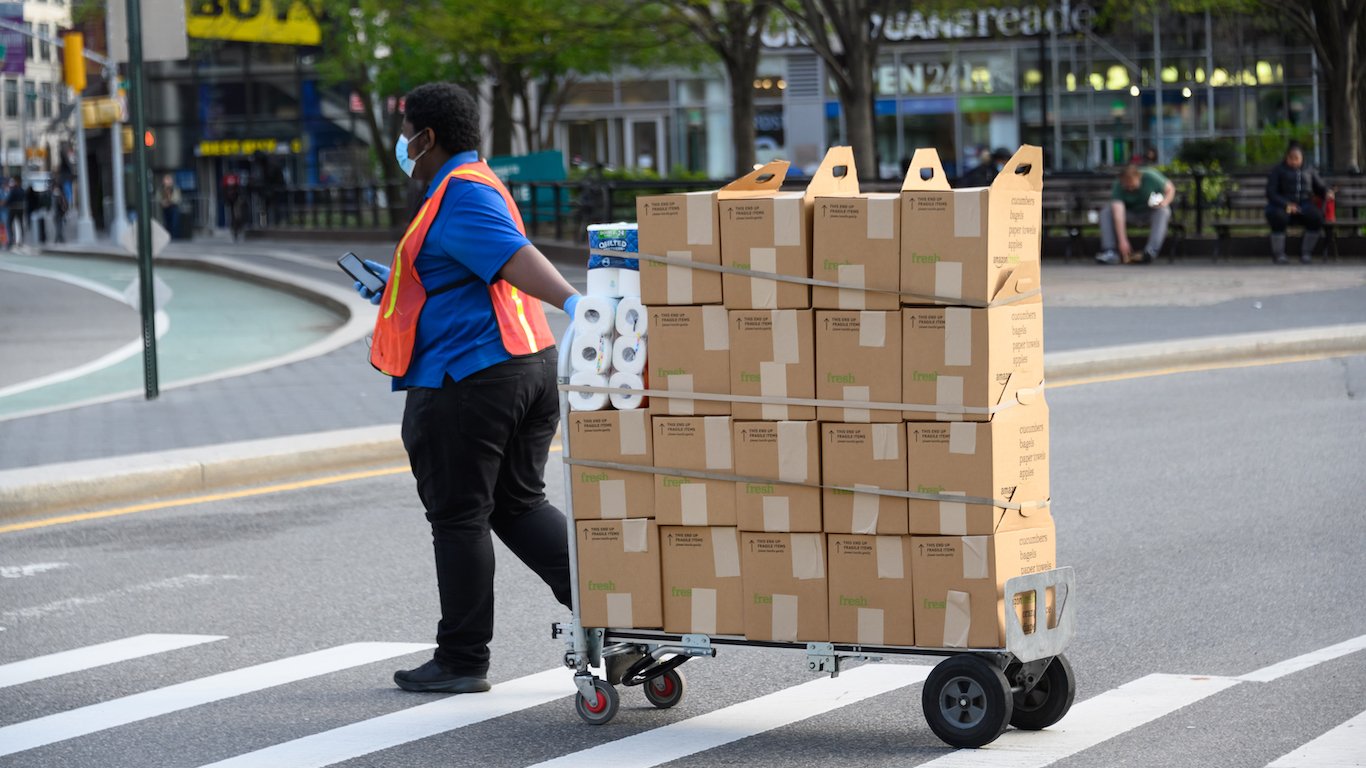

In the early days of the COVID-19 pandemic, Amazon.com Inc. (NASDAQ: AMZN) struggled with a massive surge of online shopping. Some orders were delayed as “essential” goods were prioritized. Popular items quickly went out of stock. Grocery customers were unable to find delivery slots.
But a former Amazon insider told 24/7 Wall St. that those issues have largely been fixed, in just a few weeks. “Their ability to quickly adapt and figure out how to scale up was unbelievable,” said James Thomson, partner with Buy Box Experts and former business head of Amazon Services. That division is responsible for recruiting tens of thousands of sellers annually to the Amazon marketplace.
Amazon quickly hired 175,000 new workers to staff warehouses and increase delivery ability. “They essentially had to increase the size of the pipe,” Thomson said in a telephone interview with 24/7 Wall St.
And they got the balance right in only seven weeks. “It’s absolutely staggering. What other company could do that?”
Amazon stock closed at $2,445.74 on Thursday, down 2.05%. Overall, stock prices dropped Thursday, with the S&P 500 down 0.78%.
Pandemic Shopping Enters New Phase
Going forward, Wall Street sees little downside for Amazon, which it calls — not always affectionately — the “Death Star.” The pandemic instantly changed how consumers open their wallets. Home delivery looks to be a long-term trend, with consumers now moving beyond the initial spend on stockpiling and setting up offices for working from home.
Now “if we still have disposable income, we might be buying designer jeans and stuff for our kids that we don’t really need,” Thomson said. “We’re definitely now seeing people buy stuff that we would describe as ‘non-essential.’”
Washington’s stimulus checks appear to offer a continued boost to many retailers. This week, Walmart Inc. (NYSE: WMT) reported brisk sales of TVs, video games, clothing, toys and sporting goods. “Call it relief spending, as it was heavily influenced by stimulus dollars,” said CEO Doug McMillon.
The delivery delays for non-essential items at Amazon may have sent some business to competitors like Walmart and Target Corp. (NYSE: TGT). Walmart said online sales jumped 74% in the last quarter, compared to last year. Home Depot Inc. (NYSE: HD) reported that online sales rose 79% in the last quarter, year-over-year.
A Grocery Boom
Groceries are one area where Walmart may have an upper hand over Amazon. Some reports show the Bentonville, Arkansas-based retailer capturing about 80% of the online grocery business.
The e-commerce grocery business is growing rapidly and could reach $38 billion in sales this year, according to Coresight Research. That still only represents a fraction of the overall $600 billion-plus grocery business, so there’s lots of growth potential. A recent Business Insider report predicted that e-grocery shopping would see increased adoption among all age groups this year, including Baby Boomers who to date have preferred traditional supermarkets.
What’s worked really well for Walmart is grocery pick up at physical stores. Customers have been placing grocery orders online and then driving to the local Walmart to retrieve them. It’s been a way to avoid going inside a physical grocery store and to limit exposure to other people. Because of the pandemic, Thomson speculates Walmart has picked up many new grocery customers who may not have been regular Walmart shoppers in the past.
Walmart recently said grocery pickup and delivery sales have grown nearly 300% during the coronavirus lockdowns. New grocery customers grew four times since mid-March. To meet surging in-store demand and fulfill increased online orders, Walmart has hired 100,000 new employees.
JCPenney Rumors
Since J.C. Penney Co. filed for bankruptcy last week, speculation emerged that Amazon might consider acquiring the retailer. Women’s Wear Daily reported that Amazon executives were spotted at JCPenney’s Plano, Texas, headquarters. CEO Jeff Bezos has made some surprise moves in the past, such as the purchase of Whole Foods in 2017.
Why would Amazon be interested in an old-world retailer that has struggled for years? Thomson thinks JCPenney’s real estate, valued at $1.4 billion, could be its most valuable asset. The department store chain currently has 850 locations. He sees a couple of scenarios that could be attractive to Amazon.
In large markets, JCPenney stores could be converted to distribution centers for Prime Now. Available in about 100 cities globally, the service offers two-hour delivery of a limited product set (including some groceries) to Prime members. Delivery is free if customers spend over $35.
Apparel could be another Amazon-JCPenney play. “I don’t see Amazon buying JCPenney and turning the locations into massive Amazon apparel stores,” he said. But they could use a portion for small retail shops selling Amazon apparel, with the bulk of the footprint repositioned for Prime Now facilities.
Amazon has been investing heavily in its clothing business. Its recent “Making the Cut” reality TV show featured fashion icons Heidi Klum and Tim Gunn, with tie-ins to online apparel sales.
The average JCPenney store occupies about 100,000 square feet. Thomson says Amazon’s Prime Now staging areas usually are 50,000 square feet or less.
Essential Tips for Investing: Sponsored
A financial advisor can help you understand the advantages and disadvantages of investment properties. Finding a qualified financial advisor doesn’t have to be hard. SmartAsset’s free tool matches you with up to three financial advisors who serve your area, and you can interview your advisor matches at no cost to decide which one is right for you. If you’re ready to find an advisor who can help you achieve your financial goals, get started now.
Investing in real estate can diversify your portfolio. But expanding your horizons may add additional costs. If you’re an investor looking to minimize expenses, consider checking out online brokerages. They often offer low investment fees, helping you maximize your profit.
Thank you for reading! Have some feedback for us?
Contact the 24/7 Wall St. editorial team.
 24/7 Wall St.
24/7 Wall St.


